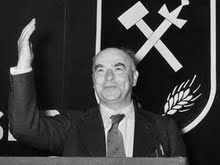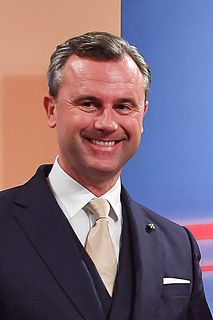
The politics of Austria take place in the framework of the federal parliamentary republic of Austria, with a President as head of state, and a Chancellor as the head of government. Governments, both local and federal, exercise executive power. Federal legislative power is vested both in the Federal Government and in the two chambers of Parliament; the National Council and the Federal Council. The Judiciary of Austria is independent of the executive and the legislature.

The Austrian People's Party is a conservative Christian-democratic political party in Austria. A successor to the Christian Social Party of the late 19th and early 20th centuries, it was founded immediately following the reestablishment of the Republic of Austria in 1945 and since then has been one of the two largest Austrian political parties with the Social Democratic Party of Austria (SPÖ). In federal governance, the ÖVP has spent most of the postwar era in a grand coalition with the SPÖ. Most recently, it has been junior partner in a coalition government with the SPÖ since 2007. However, the ÖVP won the 2017 election, having the greatest number of seats and formed a coalition with the far-right Freedom Party of Austria (FPÖ). Its chairman Sebastian Kurz is the youngest Chancellor in Austrian history.

Otto Johann Maximilian Strasser was a German politician and an early member of the Nazi Party. Otto Strasser, together with his brother Gregor Strasser, was a leading member of the party's left-wing faction, and broke from the party due to disputes with the dominant "Hitlerite" faction. He formed the Black Front, a group intended to split the Nazi Party and take it from the grasp of Hitler. This group also functioned during his exile and World War II as a secret opposition group.
Nazi songs were songs and marches created by the NSDAP. In modern Germany, the public singing or performing of songs exclusively associated with the NSDAP is now illegal.
This article gives an overview of liberalism in Austria. It is limited to liberal parties with substantial support, mainly proved by having had representation in parliament. For inclusion in this scheme it isn't necessary that parties labeled themselves as a liberal party.

The Alliance for the Future of Austria is a right-wing populist and national conservative political party in Austria.
The Federation of Independents was a German nationalist and national-liberal political party in Austria active from 1949 to 1955. It was the predecessor of the Freedom Party of Austria (FPÖ).
The Christian Social Party was a major conservative political party in the Cisleithanian crown lands of Austria-Hungary and in the First Republic of Austria, from 1891 to 1934. The party was also affiliated with Austrian nationalism that sought to keep Catholic Austria out of the state of Germany founded in 1871, that it viewed as Protestant Prussian-dominated, and identified Austrians on the basis of their predominantly Catholic religious identity as opposed to the predominantly Protestant religious identity of the Prussians. It is a predecessor of the contemporary Austrian People's Party.
Friedrich Peter was an Austrian politician who served as the chairman of the Freedom Party of Austria from 1958 to 1978.
National liberalism is a variant of liberalism, combining liberal policies and issues with elements of nationalism and/or a term used to describe a series of European political parties that have been especially active in the 19th century in several national contexts such as Central Europe, the Nordic countries and Southeast Europe.

Anton Reinthaller was an Austrian right-wing politician active before and after the Second World War. After a career in Nazi Germany as an SS-Brigadeführer and member of the Nazi Reichstag, he was the inaugural leader of the Freedom Party of Austria (FPÖ).

Jörg Haider was an Austrian politician. He was Governor of Carinthia on two occasions, the long-time leader of the Austrian Freedom Party (FPÖ) and later Chairman of the Alliance for the Future of Austria, a breakaway party from the FPÖ.

The Freedom Party of Austria is a right-wing populist, national-conservative political party in Austria. The party, led by Heinz-Christian Strache, is a member of the Europe of Nations and Freedom group in the European Parliament, as well as of the Movement for a Europe of Nations and Freedom.
The Freedom Party in Carinthia was a political party in Austria, operating in the federal state of Carinthia.

Ewald Johann Stadler, is an Austrian right-wing conservative politician. He was a member of the Freedom Party of Austria (FPÖ) until 2007, and a member of the Alliance for the Future of Austria (BZÖ) from 2007 until 2013. He ran for the European Parliament in 2009 as BZÖ's leading candidate and was a member of the European Parliament from 2011 to 2014. In 2014 he was chosen as the first party leader of The Reform Conservatives (REKOS).

German nationalism is a political ideology and historical current in Austrian politics. It arose in the 19th century as a nationalist movement amongst the German-speaking population of the Austro-Hungarian Empire. It favours close ties with Germany, which it views as the nation-state for all ethnic Germans, and the possibility of the incorporation of Austria into a Greater Germany.

The Social Democratic Party of Austria is a social-democratic political party in Austria that is, along with the People's Party, one of the country's two traditional major parties.

Norbert Gerwald Hofer is an Austrian politician, a member of the Freedom Party (FPÖ) and since 18 December 2017 the Minister of Transport, Innovation and Technology. He was the Third President of the National Council from 2013 to 2017.
Since its foundation in 1889, the Social Democratic Party has often been one of the main political forces in Austria. At the start of the First World War it was the strongest party in parliament, and on the ending of that war in 1918 the party leader Karl Renner became chancellor of the First Republic. The party lost power in 1920, but retained a strong base of support in the capital Vienna. A period of rising political violence culminated in the banning of the Social Democratic Party under the Austrofascist dictatorship (1934–38).

Udo Landbauer is an Austrian politician from the FPÖ. From 2011 to 2018 he was head of the FPÖ Youth Ring, from 2010 to 2018 Landbauer was a municipal politician in Wiener Neustadt and from 2013 to 2018 he was a member of the Landtag of Lower Austria. He was the leading candidate of the FPÖ in the 2018 Lower Austrian state election. As a result of the affair surrounding the Germania zu Wiener Neustadt fraternity, he resigned from all political functions on 1 February 2018 and suspended his FPÖ party membership. On the 20. September he officially returned as member of the Freedom Party of Austria into the Landtag of Lower Austria. On the same day he was elected as the head of the FPÖ of Lower Austria.


















